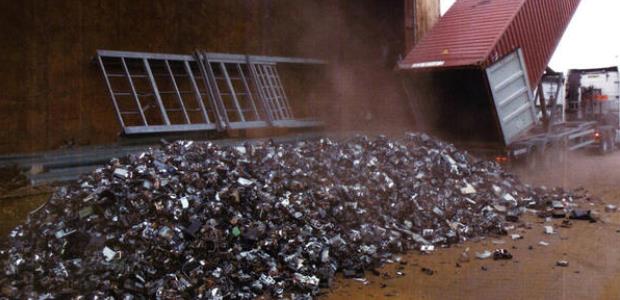
INTERPOL Operation Nets 1.5 Million Tonnes of Illegal Waste
Most of the illegal waste discovered during the operation was metal or electronic waste, and generally it was related to the car industry. In all, 226 waste crimes and 413 administrative violations were found, including criminal cases of 141 shipments carrying a total of 14,000 tonnes of illegal waste and 85 sites where more than 1 million tonnes of waste was illegally disposed.
The largest global operation against illegal waste collected more than 1.5 million tonnes of it worldwide, INTERPOL reported. The "30 days of action" took place during June 2017, targeting waste crime and trafficking, with police, customs, border, and environmental agencies from 43 countries participating. Previous actions focused on electronic waste, but this one included all types of illegal waste, such as industrial, construction, household, and medical waste.
INTERPOL says waste crime is a worldwide concern: Of the 275 million tonnes of plastic waste generated in 2010, up to 12.7 million tonnes were illegally dumped into the ocean, and during 2014, only 10 to 40 percent of the 42 million tonnes of electronic waste generated globally were disposed of properly.
The 2017 operation was initiated by INTERPOL's Pollution Crime Working Group in response to a call from the global law enforcement community to gather more information about illegal waste streams between countries and regions. "The '30 days of action' was a great success. Besides being the largest global anti-pollution operation ever, it shows what can be accomplished when countries work together to detect, disrupt, and deter pollution crime," said Joseph Poux, deputy chief of the Environmental Crimes Section at the U.S. Department of Justice and chair of the Pollution Crime Working Group. "INTERPOL and the countries and partners involved should be pleased with the results, while the organized criminal groups involved in illicit waste trafficking should be warned that they will be caught."
Most of the illegal waste discovered during the operation was metal or electronic waste, and generally it was related to the car industry. In all, 226 waste crimes and 413 administrative violations were found, including criminal cases of 141 shipments carrying a total of 14,000 tonnes of illegal waste and 85 sites where more than 1 million tonnes of waste was illegally disposed. The action was carried out in close cooperation with the European Union Network for the Implementation and Enforcement of Environmental Law (IMPEL) and with the UN Environment project Regional Enforcement Network for Chemicals and Waste (REN) in Asia, which the agency says underscores the need for a coordinated response among stakeholders globally.
The operation confirmed that Asia and Africa were the main destinations for waste illegally exported from Europe and North America, with trafficking also occurring between countries within Europe. For instance, authorities in the Netherlands discovered more than 10,000 tonnes of waste suspected to be involved in illegal trafficking within Europe and from the Netherlands to countries in West Africa, South and Southeast Asia, and the Caribbean.